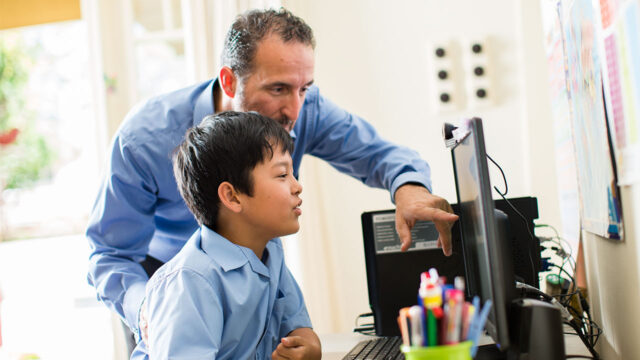
There are thousands of articles and cautionary tales about the dangers of technology for children. From cyberbullying to grooming, these dangers are real. But what about using that same technology to keep them safe? Is it even possible? You might already know the answer. There are apps that help track their whereabouts and even services that allow you to perform background checks on the adults that may be involved in their lives (such as babysitters and/or tutors). While it is recommended to proceed with caution when it comes to kids using technology, it is also extremely helpful to protect them.
1. Verify Information

Our digital footprint is very real and attached to us forever. We live in a time in which most of what we do leaves a trail that is easy to track. Employers review employees through social networks, and what we share on social media is never really erased. If you want to make sure that you are dealing with honest people, a good place to start is an online search. While the main search engines can give you a wealth of information, there is also the possibility of getting lost in one of the internet’s rabbit holes and following the wrong leads.
Services such as CheckPeople offer to crawl thousands of websites and organize the information in a simple report. This is very helpful if you are trying to verify the identity and credentials of people such as housekeepers, babysitters, and tutors. While there are many sites that offer similar services, checkpeople give you the benefit of performing unlimited checks for a very low fee.
2. Safe Transportation and Mobility

GPS devices such as smartphones or smartwatches help you know where your child is, all the time. This is especially helpful when they use public transportation, or for parents of teenagers. Many apps allow children to send an SOS signal whenever they feel endangered, and this signal is shared with local authorities who can act fast. An example of these apps is life360, in which you are able to create groups (such as a family group) and decide when to share your location. Whatsapp offers a similar option in which you can share your real-time location for a set period.
3. Safely Using the Internet

Most internet providers offer parental controls in which you can track your child’s online activity and set boundaries to the type of websites they can visit. Some social networks, such as Facebook, offer certain features to protect children (for example, Facebook has messenger kids). Protecting your child’s online activity is really important, not just to keep them safe today, but to help them remain safe when they grow up. There are several sites in which you can find out more about protecting children’s online privacy and the laws that regulate the subject.
4. Surveillance Systems
So, you decided to hire a nanny. You performed your background checks, you called her references and your kids like her. If you are not ready to leave them entirely alone, there are several options of surveillance systems that you can install in order to check what’s going on in your home while you are away (these are often called nanny cams, and there are responsibilities that come from having them. To learn more about the subject, you can visit this article). These are also very helpful for older kids who stay alone at home, as most home surveillance systems are usually connected to a central office that can dispatch private security and notify the authorities in case there’s trouble. Price ranges for home surveillance systems vary a lot, so try to research those that offer exactly the features that you need (for example, you might opt-out of indoor cameras).
5. Education and Communication

While technology offers interesting options to help keep your children safe, none of these are better than open communication. If your kids are exposed to technology, it is essential to teach them certain principles that will help them remain safe. The most important thing is for your children to know they can trust you, and they can tell you about any kind of interaction that makes them feel uncomfortable. Then, a few basics include: never sharing personal information online and never agreeing to meet someone they met online. Internet activity should be monitored according to a child’s age. Remember that teenagers are extremely vulnerable, and they tend to trust strangers easily, so always keep an eye on their conversations. Important mood changes can be related to cyberbullying.
Tech-based security tools are a very useful way to keep your children safe, but none of them works alone. Adults should be aware of their kid’s activities (online and offline). Children should always be allowed to express discomfort around an adult (a nanny or even a family member), and they need to know they can establish boundaries.







